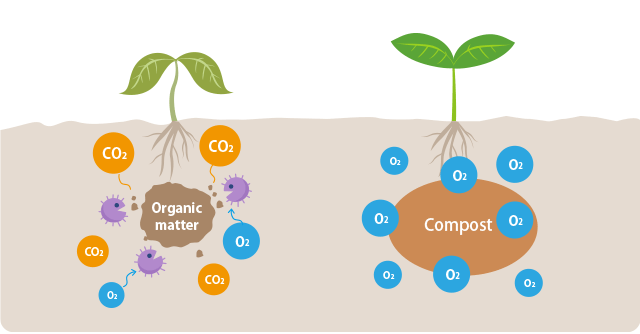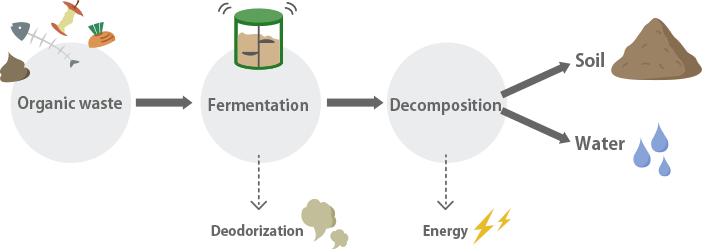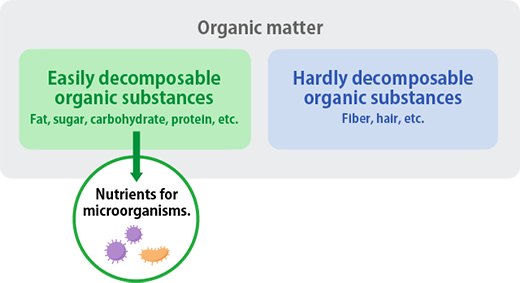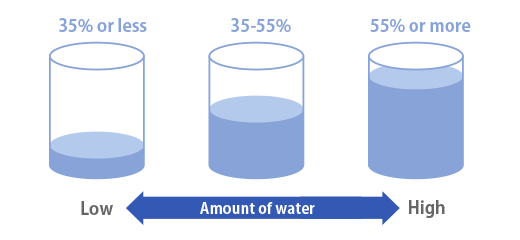Purpose of Composting
1. Eliminate waste feeling and make handling easier
Organic waste, especially livestock manure, has dirty feelings like stinky and sticky and is not easy to handle. This is due to high moisture and going bad of organic matter.
It makes it easier to handle to reduce moisture and decomposing organic matter by composting.
2. Decomposition of organic matter
When microorganisms decompose organic matter, they consume oxygen and generate carbon dioxide. When organic matter is decomposed in the soil, oxygen may be deficient, which may affect soil and crops. It is necessary to decompose some organic matter by composting.
3. Death and inactivation of pathogenic bacteria, parasitic eggs, weed seeds
Fermentation heat is generated when organic matter is decomposed during the composting process. This high temperature kills pathogens, parasite eggs, and weed seeds or inactivates them.
4. Improve preservation
Long-term preservation becomes possible by composting.

Flow to Compost Organic Wastes
Organic waste is waste derived from animals and plants. For example, livestock manure, solid waste produced from the manufacturing process of food such as vegetable residue, brewing residue, fermentation residue, and waste of fish and animals. Organic fertilizer is produced from organic waste by microorganisms. They decompose easily decomposable organic matter.
To speed up the process artificially is called composting and it is necessary to create an environment where microorganisms are easy to operate.
In general, composting is decomposition by aerobic microorganisms and aerobic fermentation.

Conditions Necessary for Aerobic Fermentation
Aerobic fermentation is carried out by the activity of aerobic microorganisms. It is important to create and maintain conditions where aerobic microorganisms can be active. Aerobic microorganisms need air to breathe.
Nutrient source for the activity of microorganisms is necessary. Moisture is also important. But breathability gets worse if moisture is too high and even if the moisture is too low, the growth of microorganisms is suppressed so appropriate moisture adjustment is also necessary. Microorganisms involved in composting are activated at an ambient temperature of 30 ° C or higher and temperatures of 60 ° C or more are necessary for killing or inactivating pathogens, parasite eggs, or weed seeds.
It is also related to the evaporation of moisture so it is required to control the temperature.

Aerobic Microorganisms
Microorganisms for composting exist naturally in raw materials, air, livestock houses, etc.
Uniform Air Supply
Air (oxygen) is essential for aerobic microorganisms necessary for fermentation.
Because aerobic microorganisms oxidize by decomposing organic matter using air, generates fermentation heat by oxidation reaction and promotes evaporation of moisture.
In the composting process, 「1. Air flowing」 in the raw material is an important point. Next, it is also important to 「2. Adjust proper moisture before composting treatment」「3. Continue proper airflow into raw materials」.
By regularly performing stirring and turning back, it makes uniform contact with the air and does not cause fermentation irregularity.
However, excessive stirring and turning down will lower the internal temperature and will slow down composting, so it is important to be proper.
Nutrition Source
There are two kinds of Organic substances. One is organic substances that are easily decomposed (easily decomposable organic substances) and another is organic substances that hardly decomposed (hardly decomposable organic substances). Most of the nutrient source of microorganisms is easily decomposable organic substances.
Livestock manure and others containing a lot of easily decomposable organic matter are rich in nutrients for microorganisms.


Appropriate Water Content
When moisture is too high, breathability is going bad, and even if the moisture is too low, the growth of microorganisms is suppressed, so appropriate water content adjustment is necessary. By appropriately maintaining the moisture of the raw material to be composted, it will shorten the processing time.
Appropriate Temperature
Aerobic microorganisms oxidize by decomposing organic matter using air and fermentation heat by oxidation reaction occurs.
As aerobic fermentation is promoted, the internal temperature rises above 60 degrees. As a result, moisture evaporates, and pathogenic bacteria and weed seeds are killed and inactivated.
It is possible to maintain a stable fermentation condition by preventing the influence of the external environment and performing aeration at high temperatures.
What are the Merits of Using Compost?
By properly using organic fertilizer, we can stably increase the production of crops by supplying nutrients to plants, improving the chemical, material, and biological of the soil, and increasing soil productivity.
Compost is a kind of fertilizer for both plants and soil.
Chemical fertilizers are excellent as fertilizer components, but microorganisms in the soil are killed as organic matter is not supplied. When soil cultivation to make crumb structures by microorganisms is stopped, soil productivity declines, the plants become weak against diseases and pests, and need to use fungicides and insecticides.
